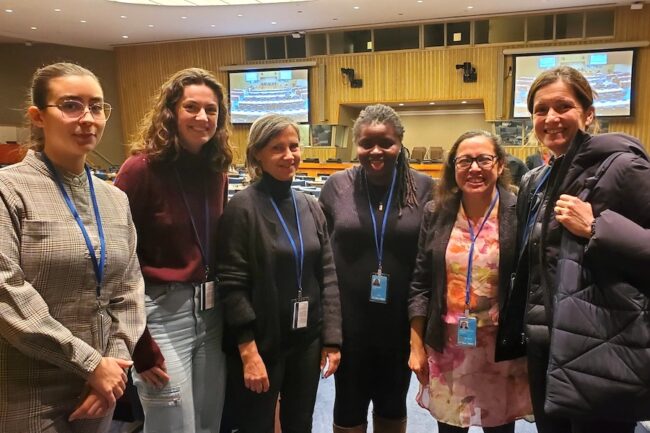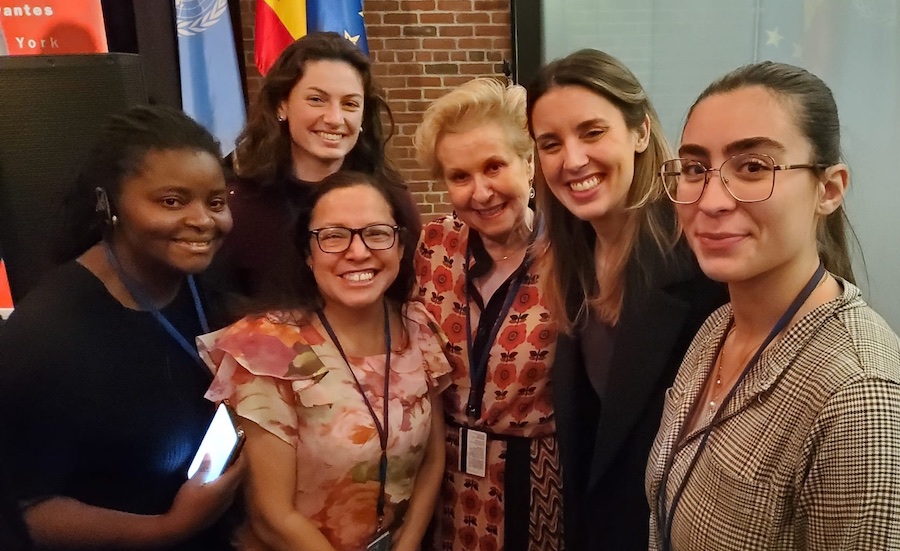Global support for recognition of ‘Care as a Right’ gains momentum – MMM teams look back at CSW 2023
27.04.23
UN New York - This year’s priority theme of the UN Commission on the Status of Women (CSW) was ‘Innovation, technological change, education in the digital age for achieving gender equality and the empowerment of all women and girls’. The following is a brief report on the highlights of this session.

Gender Equality remains an important concern: at the current rate of progress, UN Women puts it at almost 300 years away. When it comes to digital rights, three billion people are still unconnected, the majority of them being women in developing countries. It is also important to bear in mind that technology cannot be used to its full potential unless women are involved.
As UN Secretary General Antonio Guterres reaffirmed at the opening session: ‘We cannot let the Silicon Valleys of our world become Death Valleys for women’s rights’.
The 2023 Commission revealed the real and multiple challenges of including women more broadly in the digital environment. But it was also an opportunity to exchange knowledge and good practices. Digitalization and digital tools offer many possibilities for the empowerment of women. Technologies can help reduce the time women spend on unpaid care work, allowing them more time to be involved in paid work or other activities. However, if a technology like artificial intelligence can free time, it has not demonstrated the necessary empathy needed to care for people. Technology does not replace caregivers, whose role remains essential.
Technology can play a key role in creating solutions to advance gender inequality. But challenges regarding accessibility remain: it begins simply with internet or even electricity access. Data and artificial intelligence are other key challenges. Regarding data, we recognize its importance and the convenient use of technology to collect it. But we need more gender disaggregated data, and surveys must be accessible (in an open format, with easy use and understandable language). Artificial intelligence generates biases, especially towards women. The algorithms on which artificial intelligence tools are based are developed by teams that are largely composed of men, which can lead to discrimination. The CSW also emphasized the importance and the urgency to involve more women in STEM.
Through diverse and compelling side-events, other topics were also covered during the 2 week-long annual Commission, including, some more specifically relevant to mothers and Care.
Some key takeaways:
- Spain proposed the establishment of an International Day of Care Rights, in order to celebrate and reaffirm the importance of Care rights and give visibility to such international alliances as the Global Alliance for Care, which was launched in 2021 as part of the Gender Equality Forum
- The ILO, with the support of the Bill & Melinda Gates Foundation, has developed the Care Policy Investment Simulator, the largest online Care policy tool, which once it is launched will be available to the general public. It is built on over 180 statistical indicators and will contain data from more than 80 countries worldwide
- Mexico and Argentina are working on a Care map, and Chile is implementing a national register of care workers
- Several CSW side-events emphasized the need to recognize the important role of parents, and the need for Member States to provide family friendly policies such as paid parental leave and accessible childcare
- UNICEF highlighted the importance of the caregiver’s mental health
- The idea of considering Care as a human right is gaining ground, and is now being supported by an increasing number of countries, mainly in Latin America
In conclusion, CSW has a vision of technology as an effective tool to empower women and reduce gender inequalities – a tool that we must develop and make accessible for all.
Very encouraging for MMM is the increasing attention of Member States on the issue of unpaid (and underpaid) care work as a structural barrier to Gender Equality; Latin American countries, including Argentina, Chile, Mexico and Uruguay, have clearly taken the lead, recognizing Care as a Right or implementing a National Care Policy.
We at MMM are committed to continuing our advocacy work to raise awareness of the issue, to promote comprehensive and inter-sectoral national Care policies, and to call for the recognition of Care as a Right at the Global Level: Right to Care, Right to be cared for and Right to Self-Care.
➔ See also our written statement to the Commission: ‘Harnessing digital technologies to empower mothers – and their children‘

From left to right: Passy Mubalama, Founder & Director of AIDPROFEN, MMM Associate Member based in DRC, Constance Nothomb, MMM; Jacqueline Leduc, MMM; Carmen Quintanilla, Director of AFAMMER, MMM Associate Member based in Spain; Irene Montero, Minister of Equality of Spain; Justine Besson, MMM
The New EU Gender Equality Roadmap : A Call for Inclusion of Mothers
04.03.25
The European Commission’s initiative on a new Gender Equality Roadmap post-2025, marks a significant step forward in addressing gender disparities across the European Union. Make Mothers Matter (MMM
Breaking the Cycle: Gender Equality as a Path to Better Mental Health
18.03.25
The Council of the European Union has taken a decisive step in recognising the vital connection between gender equality and mental health.
Europe Must Listen to Mothers: Our landmark report heads to the European Parliament
28.08.25
On 22 September 2025, the voices of mothers will take centre stage in Brussels. For the first time, Make Mothers Matter (MMM) will present its State of Motherhood in Europe








